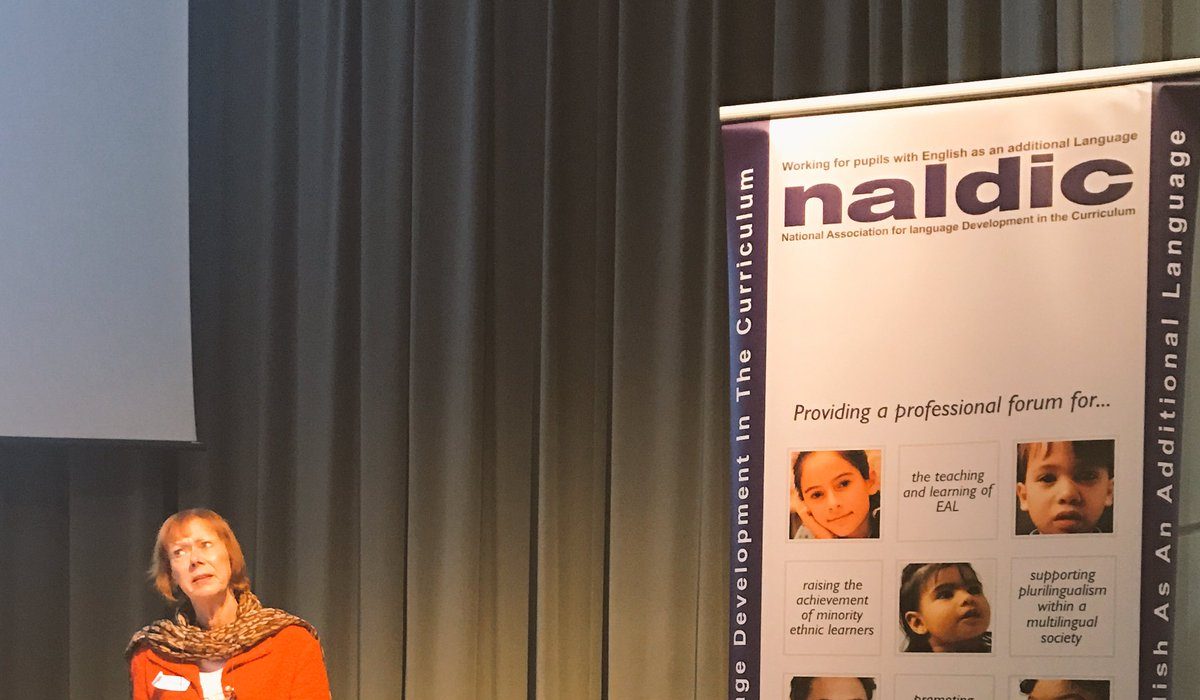One of the key aspirations of NALDIC is to help forge links between practitioners, researchers and policy makers. We believe that when these groups talk to each other everyone has a much better chance of driving EAL-related research, policy and practice in the right direction. However, it can sometimes be daunting to take a step outside one’s comfort zone and enter the realm of another. This was how Cherry Pearce felt when the opportunity presented itself to attend the Inside Government conference – Delivering Outstanding Teaching for EAL Pupils – in London last month. Cherry is the EAL Coordinator for the Archway Learning Trust, and teaches in one of its schools in Nottingham. She was apprehensive about attending the conference, wondering about how she might fit in among representatives of government, NGOs, charitable foundations and other EAL-related fields, as well as those involved at the chalk face of EAL teaching. In this post she describes some of that trepidation, and how, ultimately, the value of the experience came from seeing that none of us have the monopoly on the discussion and that we all learn from each other. She describes a sense of collegiality and common purpose among delegates, and a renewed sense of purpose when she returned to school. NALDIC encourages all educators to get involved in the discussion at all levels. As Cherry can testify, the rewards are potentially enormous.

At Archway Learning Trust we strive to ensure the delivery of quality EAL provision. Our vision is that all staff take on the challenge and the responsibility for the delivery of quality first provision and work together to meet the needs of all individuals. It was in pursuit of this aim that I signed up to attend such a prestigious event as the Inside Government Conference – Delivering Outstanding Teaching for EAL Pupils.
After signing up, I felt inspired, intrigued … and internally stressed.
A window into my thoughts before the event began. Why did I feel stressed?
Am I really an expert in what I hold close to my heart and have as a professional role? Will my currently thinking be blown out of the water or will I be left exposed, flailing and sinking into the abyss of unknown acronyms? As an experienced practitioner I am aware that I shouldn’t be thinking like this; as an adult who is aware of her own context and limitations it is simply my internal narrative.
A state of perpetual reflection and an instinctive awareness of context are at the heart of what we do in education. It has to be at the heart of what we do for EAL/all learners. So, stressed or otherwise, I headed for London.
A window into my context.
I was born in Manchester and not long after I started school we moved to North Devon. I may not be fluent in multiple languages but I certainly had to adapt my register, accent and dialect in order to be understood which I am reminded of in the classroom with EAL students. As a teenager I craved city life and moved to London for University – Roehampton to study English Literature. I then qualified as an English Teacher via the PGCE route in 2000 from Bath University. My teaching practice was in Somerset and first post in North Devon before moving to Nottingham in January 2002. In 2003 I met my first New Arrival/Beginner to English which began my professional EAL journey.
My thoughts and reflections – beyond the conference. Is this an open door?
I felt inspired to be with so many people who have English as an Additional Language/Multilingualism on their agenda. I welcomed the opportunity to network and share practice. I heard commonality with the changes that have occurred over the past few years, the celebration of the raised profile of EAL alongside the frustrations of budget cuts and the squeeze of provision. I took the opportunity (in an out-of-body-experience braving the microphone) and explained my EAL journey. How as a school we used to have access to many external agencies involvement and the local authority support. With the changes over the years those services have been squeezed and we have had to become much more inward looking which has impacted outreach work and networking opportunities.
In my moment with the microphone, I tried to point out that we have all lived through these frustrations, need to make the most of our wealth of expertise and drive this network forward. To NOT feel that the assessments (using the Bell Foundation’s framework of course) and delivery only falls to the one named person. All staff being responsible for EAL in order to create the drive for the whole school approach is essential. As EAL Coordinator I stressed in my interview that my vision would be to have a “top down” and “bottom up” approach to EAL provision. Raising the profile of what good EAL practice is for all staff and ensuring the best “school diet” to be delivered for all individuals with effective induction for new arrivals/beginners. I was pleased to receive conference attendees’ email addresses to begin constructing a wider network for myself, beyond my own city to celebrate the successes and empower ourselves with that wider support.
In attending the conference, I felt that I had opened some doors that perhaps had wrongly felt closed before; my windows were now open, or at least freshly cleaned.
Inspired by the title of EAL specialist Jonathan Bifield’s blog, Keeping EAL in the Daylight, I now think of our practice at Archway in terms of keeping those doors and windows open. Is this a forced metaphor? I like to think of it as a lovely way of reminding ourselves to embrace and enhance our multi-lingual/EAL learners?
The EAL-focussed Inside Government Conference is expected to be reconvened in July, this time in Birmingham. NALDIC will of course be in attendance. We hope that teachers like Cherry will be there in strength to continue to conversation.


